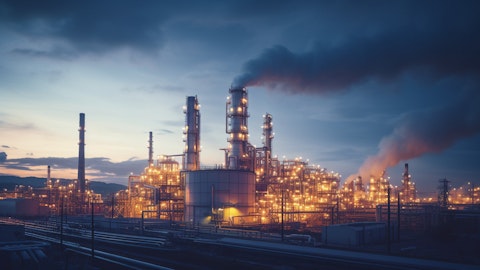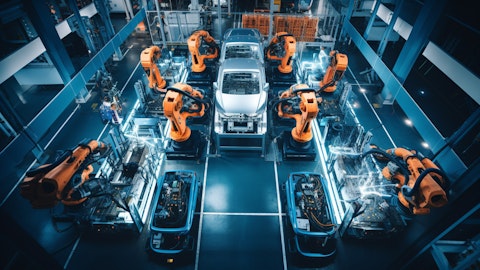Seifi Ghasemi: David, you broke up, I didn’t understand which project you were referring to?
David Begleiter: The Alberta project. When will it come on stream and how are you thinking about the earnings cadence post its start-up early next year?
Seifi Ghasemi: Excellent. I’ll have Dr. Serhan answer that. Samir?
Samir Serhan: Thank you for the question. We remain incredibly excited about our first blue net zero hydrogen project that’s in the construction phase right now. We look to bring it on stream in fiscal year ‘25 in line with our customer plans. There are no updates in regard to the deployed capital and also the government incentive we provided that already. So again, we’re really fully committed to this asset and things are going well, and we’re aligned with our customer IOL.
David Begleiter: We’ll be online in the first-half of this fiscal year? Sorry.
Samir Serhan: It’s in fiscal year ‘25, I mean, in the second-half.
David Begleiter: Second-half, Thank you.
Samir Serhan: This is really an alignment with the plan, the renewable refinery.
David Begleiter: Thank you.
Seifi Ghasemi: So basically everything is going well for that up to now.
David Begleiter: Thank you very much.
Seifi Ghasemi: Thank you.
Operator: Thank you. We’ll go next to Josh Spector from UBS.
Josh Spector: Hi, good morning. So I wanted to follow-up just on the guidance and maybe ask specifically, you know, when you talk about the challenges and uncertainty, China and helium demand, et cetera. I guess to hit your second-half, do markets need to improve or are you assuming any improvement there? Or is status quo plus what you see coming online enough to get to what your expectations are today for the second-half?
Seifi Ghasemi: No, we don’t expect any improvement. We expect things to be the way they are. I just hope that things don’t get worse because of the geopolitical developments. But we are not factoring in any significant improvement in the world economy. No, that’s correct.
Josh Spector: Okay, thanks. That’s helpful. And just on the sale of equipment, so when you talk about the increase in cost there, is that cost to execute? Is that material issue a specific contract? Just thinking about how unique or one off that is. And when you talk about your LNG wins and you’ve been talking about more projects coming online or sales in the next couple of years, is that a risk we need to think about with some of those contracts underwater or some other cost issue?
Seifi Ghasemi: If I may answer the second part, the LNG thing we expect the projects that you’re talking about are the projects which are already under execution and we have won. So the risk on that is low. With respect to the sale of equipment thing, what we are talking about is inflation and delays in execution and all of that that is costing us money. Okay?
Josh Spector: Okay, yes. Thank you.
Seifi Ghasemi: Thank you very much.
Operator: Thank you. We’ll go to Marc Bianchi from TD Cowen.
Marc Bianchi: Hi, thank you. The question was asked earlier about the large components of CapEx and you mentioned NEOM, the two blue hydrogen projects and SAF. You provided an update on Alberta just now. I’m curious if you could update us on the status of the other three?
Seifi Ghasemi: Well, on the other three, we don’t have anything substantial to report other than what we have told you before. So, things are going okay with them as of right now. So we do not have anything material that has happened to report to you.
Marc Bianchi: Okay. Thank you, Seifi. Could you just remind us the start-up expectation for NEOM Louisiana and SAF?
Seifi Ghasemi: NEOM, we are expecting December 31, 2026. With Louisiana, what we have said up to now has been fiscal year 2028 and with SAF it is somewhere around fiscal year 2027, depending on us getting all of the permits that we need. So, I’m sorry, with [Indiscernible], I’d like to correct that to 2027, I think I said ‘28, but in 2027. That’s approximately the timeline for those projects.
Marc Bianchi: Okay, thank you for that. The other question I had was there have been some reports in news stories lately about natural hydrogen, so naturally occurring hydrogen deposits that could be quite meaningful. I’m curious what your view of that is and if you have any involvement?
Seifi Ghasemi: We do not have any involvement in that and I don’t want to give you a scientific answer, but that’s a little bit of a pie in the sky that there’s hydrogen sitting there that you need to do to reveal and it will come out at zero cost. But we are not involved in any projects like that. And we are not going to get involved in that because we just do not think that that is reality.
Marc Bianchi: Thank you very much.
Seifi Ghasemi: Thank you.
Operator: Thank you. We’ll go next to Mike Leithead from Barclays.
Mike Leithead: Great. Thank you.
Seifi Ghasemi: Good morning.
Mike Leithead: Good morning. Could you maybe update us on the state of your ongoing discussions for green and blue ammonia potential off-take? Should we expect some off-take announcements later this year? Or do you still believe it’s better to wait until closer to project start-up to formalize some of those?
Seifi Ghasemi: Well, on that one, you are raising an excellent point. We have basically told people that do not expect any announcement about any off-take until about a year or year and a half before the plans come on stream. And the main reason for that is that we believe that as we get closer to the deadlines that companies have to comply with the new environmental rules. They would certainly realize that there are not that many real commercial facilities coming on the stream that has the product. Therefore the value of our product will be higher than what people think it is today. So we are not in a hurry to sign any agreements. We think the demand is there. So we are going to take our time. But in the meantime, if somebody wants to act sooner and gives us a contract, a long-term contract, at the prices that we expect, we might announce that sooner. But I wouldn’t want the investors to expect any announcements soon.
Mike Leithead: That makes sense. That’s Great. That makes sense. And then maybe on a similar note, I believe that the Treasury Department recently came out with guidance around the green hydrogen tax credit. I think most people viewed it as fairly strict although I also believe Air Products’ plans are pretty well aligned with this guidance. Bigger picture, do you have any concerns about the strict interpretation limiting the U.S. industry’s ability to take off or do you actually see it as advantageous for Air Products?
Seifi Ghasemi: No, we absolutely disagree with that point of view that this is limiting. I mean, how is it limiting? We are complying with every single part of what the Treasury Department has put out, the three pillars, and we are committing billions of dollars to build these facilities. Other people can do the same thing. Some people are trying to get money from the government by continuing to pollute the atmosphere. And we don’t believe that. We believe very strongly in the three pillars. That means that any electricity used for production of green hydrogen needs to be additional. Otherwise, you’re just going to use coal to replace that power that you use. So it has to be additional. The second thing, it has to be hourly.
Because otherwise in the middle of the night when there is no sun, if somebody makes green hydrogen, then you’re drawing power from the grid and that has to be replaced again from coal-fired plants and all of that. And so additionality, hourly and then the other thing is that it has to be on the same network. We are fully supportive of what the Treasury department has put out, I’d like to applaud them for sticking to their principles that the IRA was designed not to make companies rich, but IRA was designed to save the environment. And this should not allow people to get some subsidies if they are not doing something to reduce their pollution into the atmosphere. The IRA is not a handout. The IRA is designed, that is why Congress approved it, to improve the environment, And we should all abide by that.





